初中英语八大时态总结
- 格式:doc
- 大小:15.50 KB
- 文档页数:2
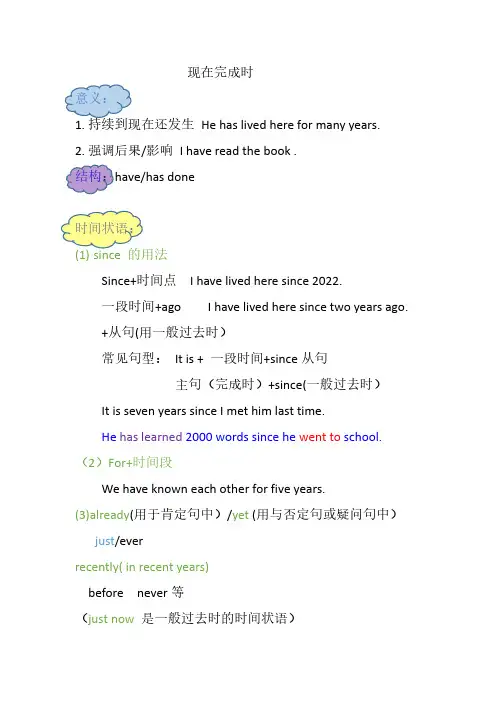
现在完成时意义:He has lived here for many years.2.强调后果/影响I have read the book .结构:时间状语:(1)since 的用法Since+时间点I have lived here since 2022.一段时间+ago I have lived here since two years ago.+从句(用一般过去时)常见句型:It is + 一段时间+since从句主句(完成时)+since(一般过去时)It is seven years since I met him last time.He has learned 2000 words since he went to school.(2)For+时间段We have known each other for five years.(3)already(用于肯定句中)/yet (用与否定句或疑问句中)just/everrecently( in recent years)before never等(just now是一般过去时的时间状语)I have just finished my homework.Have you ever seen one like this?(4So far /in the past few years等,表示:“目前为止”非延续性动词延续性动词非延续性动词延续性动词Borrow Keep Fall asleep Be asleep buy have Catch a cold Have a cold leave Be away Begin/start Be ondie Be dead open Be open Come (to)Be in/at close Be closed区分Have gone to去了没回Have been to去了回来(常与次数once/twice/基数词+times连用)Have been in在某地呆了多久例句:(1)You can’t see her because he has gone to Sibo.(2)He has been to Sibo twice.(3)He has been in this city for two years.备注:Here/there/home 不与介词连用。
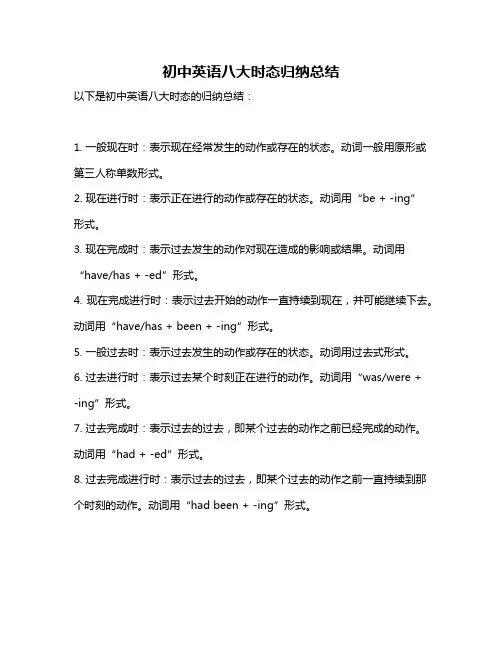
初中英语八大时态归纳总结
以下是初中英语八大时态的归纳总结:
1. 一般现在时:表示现在经常发生的动作或存在的状态。
动词一般用原形或第三人称单数形式。
2. 现在进行时:表示正在进行的动作或存在的状态。
动词用“be + -ing”
形式。
3. 现在完成时:表示过去发生的动作对现在造成的影响或结果。
动词用“have/has + -ed”形式。
4. 现在完成进行时:表示过去开始的动作一直持续到现在,并可能继续下去。
动词用“have/has + been + -ing”形式。
5. 一般过去时:表示过去发生的动作或存在的状态。
动词用过去式形式。
6. 过去进行时:表示过去某个时刻正在进行的动作。
动词用“was/were + -ing”形式。
7. 过去完成时:表示过去的过去,即某个过去的动作之前已经完成的动作。
动词用“had + -ed”形式。
8. 过去完成进行时:表示过去的过去,即某个过去的动作之前一直持续到那个时刻的动作。
动词用“had been + -ing”形式。
以上是初中英语的八大时态,理解和掌握这些时态对于英语学习和交流非常重要。
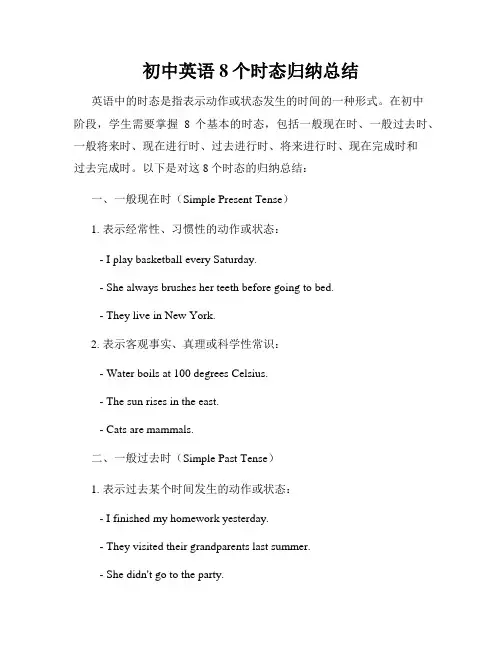
初中英语8个时态归纳总结英语中的时态是指表示动作或状态发生的时间的一种形式。
在初中阶段,学生需要掌握8个基本的时态,包括一般现在时、一般过去时、一般将来时、现在进行时、过去进行时、将来进行时、现在完成时和过去完成时。
以下是对这8个时态的归纳总结:一、一般现在时(Simple Present Tense)1. 表示经常性、习惯性的动作或状态:- I play basketball every Saturday.- She always brushes her teeth before going to bed.- They live in New York.2. 表示客观事实、真理或科学性常识:- Water boils at 100 degrees Celsius.- The sun rises in the east.- Cats are mammals.二、一般过去时(Simple Past Tense)1. 表示过去某个时间发生的动作或状态:- I finished my homework yesterday.- They visited their grandparents last summer.- She didn't go to the party.2. 表示过去的经历或习惯:- When I was young, I often went swimming. - He always ate breakfast at 8 o'clock.三、一般将来时(Simple Future Tense)1. 表示将来要发生的动作或事件:- I will go shopping tomorrow.- They are going to have a picnic next week. - She won't be late for the meeting.2. 表示将来的打算或意愿:- I am going to be a doctor when I grow up.- We will help you with your project.四、现在进行时(Present Continuous Tense)1. 表示现在正在进行的动作:- We are studying English at the moment.- He is playing soccer with his friends.- They aren't watching TV right now.2. 表示现阶段的趋势或变化:- The population is increasing rapidly.- More and more people are using smartphones.五、过去进行时(Past Continuous Tense)1. 表示过去某一时间段内正在进行的动作:- I was reading a book when the phone rang.- They were cooking dinner at 7 o'clock.2. 表示过去的同时发生的两个动作:- She was listening to music while doing her homework.六、将来进行时(Future Continuous Tense)1. 表示将来某一时间段内正在进行的动作:- Tomorrow, they will be flying to Paris.- I will be waiting for you at the station.2. 表示将来的预测或计划:- This time next month, I will be studying for my exams.七、现在完成时(Present Perfect Tense)1. 表示过去某一时间发生的动作对现在造成的影响或结果: - I have finished my homework, so I can watch TV now.- She has already eaten lunch.2. 表示过去某一时间内多次发生的动作:- We have visited that museum several times.八、过去完成时(Past Perfect Tense)1. 表示过去某一时间点之前已经完成的动作:- By the time they arrived, we had already left.- I had finished my work before the deadline.2. 表示过去的顺序或先后关系:- She realized that she had forgotten her keys after she locked the door.以上是初中英语的8个时态的归纳总结。
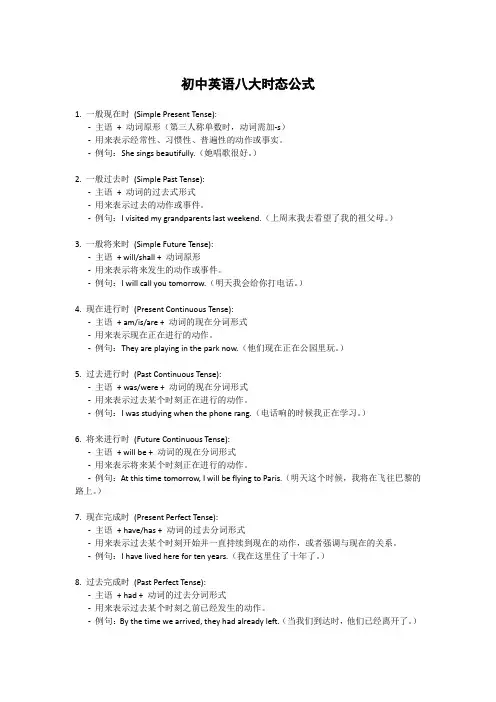
初中英语八大时态公式1. 一般现在时(Simple Present Tense):-主语+ 动词原形(第三人称单数时,动词需加-s)-用来表示经常性、习惯性、普遍性的动作或事实。
-例句:She sings beautifully.(她唱歌很好。
)2. 一般过去时(Simple Past Tense):-主语+ 动词的过去式形式-用来表示过去的动作或事件。
-例句:I visited my grandparents last weekend.(上周末我去看望了我的祖父母。
)3. 一般将来时(Simple Future Tense):-主语+ will/shall + 动词原形-用来表示将来发生的动作或事件。
-例句:I will call you tomorrow.(明天我会给你打电话。
)4. 现在进行时(Present Continuous Tense):-主语+ am/is/are + 动词的现在分词形式-用来表示现在正在进行的动作。
-例句:They are playing in the park now.(他们现在正在公园里玩。
)5. 过去进行时(Past Continuous Tense):-主语+ was/were + 动词的现在分词形式-用来表示过去某个时刻正在进行的动作。
-例句:I was studying when the phone rang.(电话响的时候我正在学习。
)6. 将来进行时(Future Continuous Tense):-主语+ will be + 动词的现在分词形式-用来表示将来某个时刻正在进行的动作。
-例句:At this time tomorrow, I will be flying to Paris.(明天这个时候,我将在飞往巴黎的路上。
)7. 现在完成时(Present Perfect Tense):-主语+ have/has + 动词的过去分词形式-用来表示过去某个时刻开始并一直持续到现在的动作,或者强调与现在的关系。
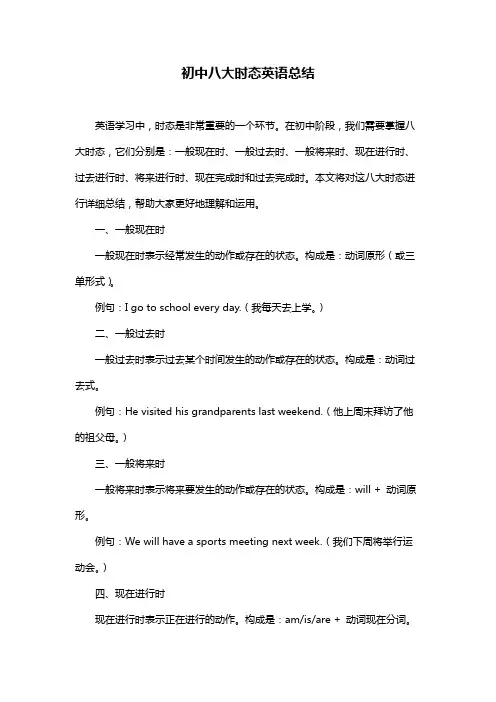
初中八大时态英语总结英语学习中,时态是非常重要的一个环节。
在初中阶段,我们需要掌握八大时态,它们分别是:一般现在时、一般过去时、一般将来时、现在进行时、过去进行时、将来进行时、现在完成时和过去完成时。
本文将对这八大时态进行详细总结,帮助大家更好地理解和运用。
一、一般现在时一般现在时表示经常发生的动作或存在的状态。
构成是:动词原形(或三单形式)。
例句:I go to school every day.(我每天去上学。
)二、一般过去时一般过去时表示过去某个时间发生的动作或存在的状态。
构成是:动词过去式。
例句:He visited his grandparents last weekend.(他上周末拜访了他的祖父母。
)三、一般将来时一般将来时表示将来要发生的动作或存在的状态。
构成是:will + 动词原形。
例句:We will have a sports meeting next week.(我们下周将举行运动会。
)四、现在进行时现在进行时表示正在进行的动作。
构成是:am/is/are + 动词现在分词。
例句:She is watching TV now.(她现在正在看电视。
)五、过去进行时过去进行时表示过去某个时间正在进行的动作。
构成是:was/were + 动词现在分词。
例句:They were playing football at 4 p.m.yesterday.(昨天下午4点他们正在踢足球。
)六、将来进行时将来进行时表示将来某个时间正在进行的动作。
构成是:will be + 动词现在分词。
例句:We will be having a meeting at that time tomorrow.(明天那个时候我们将在开会。
)七、现在完成时现在完成时表示过去发生的动作对现在造成的影响或结果。
构成是:have/has + 动词过去分词。
例句:I have finished my homework.(我已经完成了我的家庭作业。
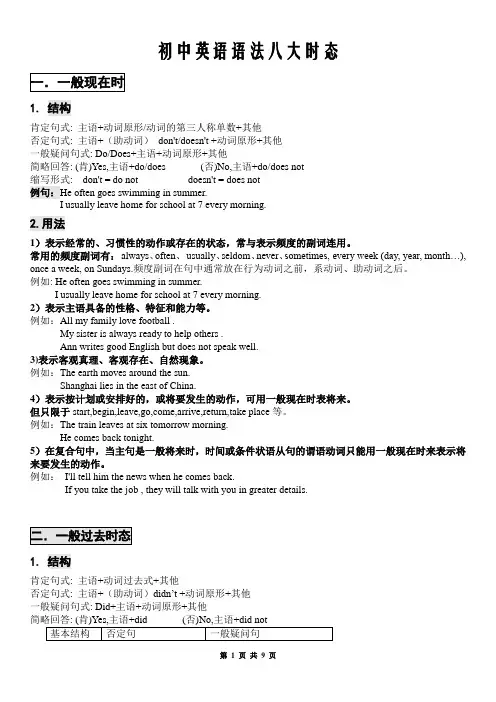
初中英语语法八大时态1.结构肯定句式: 主语+动词原形/动词的第三人称单数+其他否定句式: 主语+(助动词)don't/doesn't +动词原形+其他一般疑问句式: Do/Does+主语+动词原形+其他简略回答: (肯)Yes,主语+do/does (否)No,主语+do/does not缩写形式: don't = do not doesn't = does not例句:He often goes swimming in summer.I usually leave home for school at 7 every morning.2.用法1)表示经常的、习惯性的动作或存在的状态,常与表示频度的副词连用。
常用的频度副词有:always、often、usually、seldom、never、sometimes, every week (day, year, month…), once a week, on Sundays.频度副词在句中通常放在行为动词之前,系动词、助动词之后。
例如: He often goes swimming in summer.I usually leave home for school at 7 every morning.2)表示主语具备的性格、特征和能力等。
例如:All my family love football .My sister is always ready to help others .Ann writes good English but does not speak well.3)表示客观真理、客观存在、自然现象。
例如:The earth moves around the sun.Shanghai lies in the east of China.4)表示按计划或安排好的,或将要发生的动作,可用一般现在时表将来。
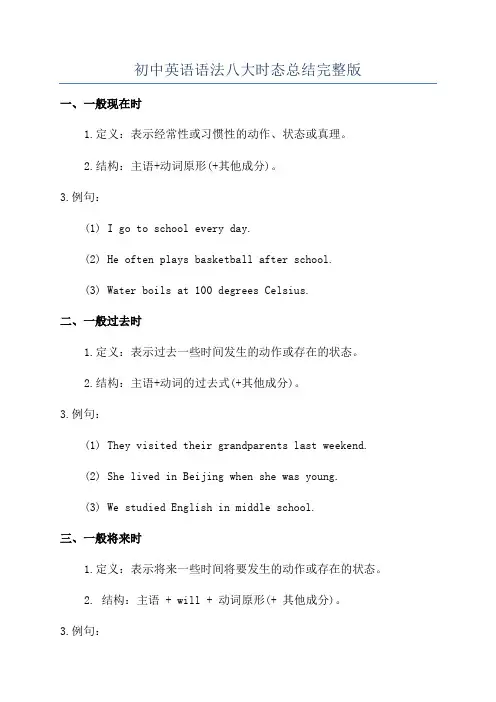
初中英语语法八大时态总结完整版一、一般现在时1.定义:表示经常性或习惯性的动作、状态或真理。
2.结构:主语+动词原形(+其他成分)。
3.例句:(1) I go to school every day.(2) He often plays basketball after school.(3) Water boils at 100 degrees Celsius.二、一般过去时1.定义:表示过去一些时间发生的动作或存在的状态。
2.结构:主语+动词的过去式(+其他成分)。
3.例句:(1) They visited their grandparents last weekend.(2) She lived in Beijing when she was young.(3) We studied English in middle school.三、一般将来时1.定义:表示将来一些时间将要发生的动作或存在的状态。
2. 结构:主语 + will + 动词原形(+ 其他成分)。
3.例句:(1) I will go to the park tomorrow.(3) We will have a party next week.四、现在进行时1.定义:表示现在正在进行的动作。
2. 结构:主语 + am/is/are + 动词-ing(+ 其他成分)。
3.例句:(1) She is reading a book right now.(2) They are playing soccer in the park.(3) We are having dinner at the moment.五、过去进行时1.定义:表示过去一些时间正在进行的动作。
2. 结构:主语 + was/were + 动词-ing(+ 其他成分)。
3.例句:(1) He was watching TV at 8 o'clock last night.(2) They were traveling in Europe during summer vacation.(3) We were studying when the phone rang.六、将来进行时1.定义:表示将来一些时间正在进行的动作。
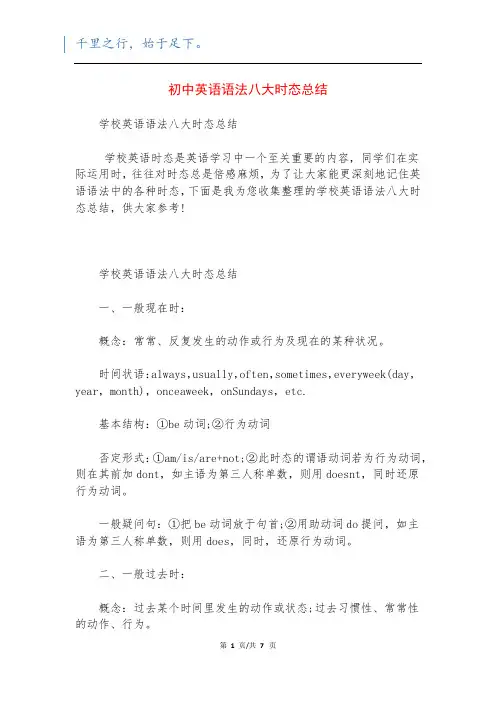
初中英语语法八大时态总结学校英语语法八大时态总结学校英语时态是英语学习中一个至关重要的内容,同学们在实际运用时,往往对时态总是倍感麻烦,为了让大家能更深刻地记住英语语法中的各种时态,下面是我为您收集整理的学校英语语法八大时态总结,供大家参考!学校英语语法八大时态总结一、一般现在时:概念:常常、反复发生的动作或行为及现在的某种状况。
时间状语:always,usually,often,sometimes,everyweek(day,year,month),onceaweek,onSundays,etc.基本结构:①be动词;②行为动词否定形式:①am/is/are+not;②此时态的谓语动词若为行为动词,则在其前加dont,如主语为第三人称单数,则用doesnt,同时还原行为动词。
一般疑问句:①把be动词放于句首;②用助动词do提问,如主语为第三人称单数,则用does,同时,还原行为动词。
二、一般过去时:概念:过去某个时间里发生的动作或状态;过去习惯性、常常性的动作、行为。
时间状语:ago,yesterday,thedaybeforeyesterday,lastweek(year,night,month),in1989,justnow,attheageof5,oneday,longlongago,onceuponatime,etc.基本结构:①be动词;②行为动词否定形式:①was/were+not;②在行为动词前加didnt,同时还原行为动词。
一般疑问句:①was或were放于句首;②用助动词do的过去式did提问,同时还原行为动词。
三、现在进行时:概念:表示现阶段或说话时正在进行的动作及行为。
时间状语:now,atthistime,thesedays,etc.基本结构:am/is/are+doing否定形式:am/is/are+not+doing.一般疑问句:把be动词放于句首。
四、过去进行时:概念:表示过去某段时间或某一时刻正在发生或进行的行为或动作。
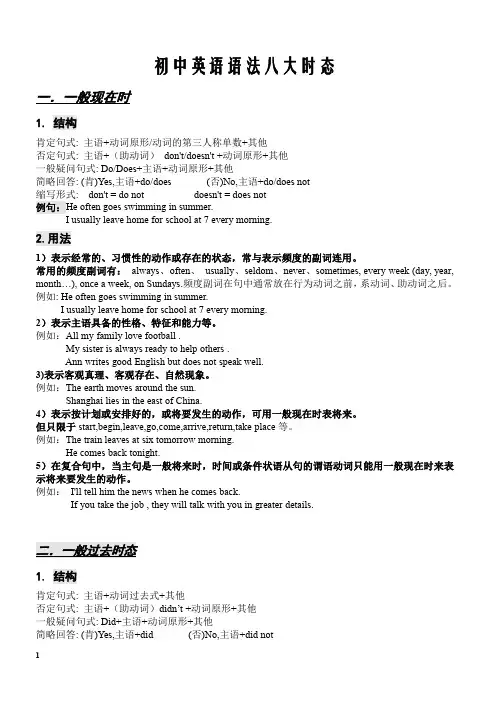
初中英语语法八大时态一.一般现在时1.结构肯定句式:主语+动词原形/动词的第三人称单数+其他否定句式:主语+(助动词)don't/doesn't+动词原形+其他一般疑问句式:Do/Does+主语+动词原形+其他简略回答:(肯)Yes,主语+do/does(否)No,主语+do/does not缩写形式:don't=do not doesn't=does not例句:He often goes swimming in summer.I usually leave home for school at7every morning.2.用法1)表示经常的、习惯性的动作或存在的状态,常与表示频度的副词连用。
常用的频度副词有:always、often、usually、seldom、never、sometimes,every week(day,year, month…),once a week,on Sundays.频度副词在句中通常放在行为动词之前,系动词、助动词之后。
例如:He often goes swimming in summer.I usually leave home for school at7every morning.2)表示主语具备的性格、特征和能力等。
例如:All my family love football.My sister is always ready to help others.Ann writes good English but does not speak well.3)表示客观真理、客观存在、自然现象。
例如:The earth moves around the sun.Shanghai lies in the east of China.4)表示按计划或安排好的,或将要发生的动作,可用一般现在时表将来。
但只限于start,begin,leave,go,come,arrive,return,take place等。
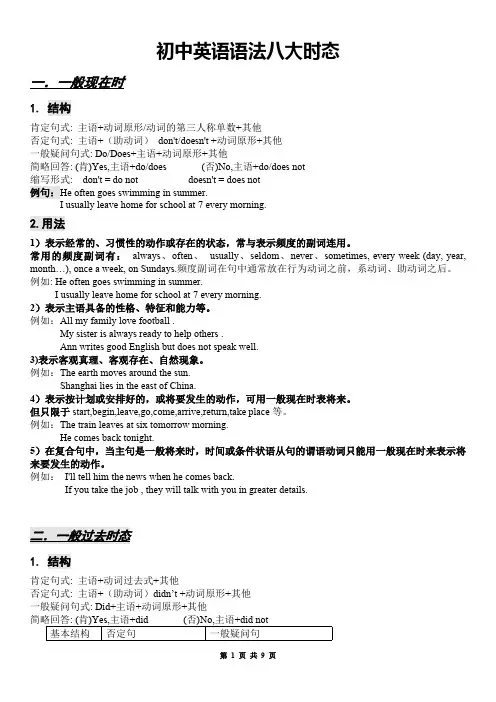
初中英语语法八大时态一.一般现在时1. 结构肯定句式: 主语+动词原形/动词的第三人称单数+其他否定句式: 主语+(助动词)don't/doesn't +动词原形+其他一般疑问句式: Do/Does+主语+动词原形+其他简略回答: (肯)Yes,主语+do/does (否)No,主语+do/does not缩写形式: don't = do not doesn't = does not例句:He often goes swimming in summer.I usually leave home for school at 7 every morning.2.用法1)表示经常的、习惯性的动作或存在的状态,常与表示频度的副词连用。
常用的频度副词有:always、often、usually、seldom、never、sometimes, every week (day, year, month…), once a week, on Sundays.频度副词在句中通常放在行为动词之前,系动词、助动词之后。
例如: He often goes swimming in summer.I usually leave home for school at 7 every morning.2)表示主语具备的性格、特征和能力等。
例如:All my family love football .My sister is always ready to help others .Ann writes good English but does not speak well.3)表示客观真理、客观存在、自然现象。
例如:The earth moves around the sun. Shanghai lies in the east of China.4)表示按计划或安排好的,或将要发生的动作,可用一般现在时表将来。

初中英语语法八大时态总结一、一般现在时态(Simple Present)1.表示现在经常性、习惯性的动作或状态:- Lucy goes to school by bus every day.- They often play basketball in the park.2.表示客观事实或普遍真理:- The sun rises in the east.- Water boils at 100 degrees Celsius.3.表示评论、观点等:- I think it's a good idea.- He doesn't like swimming.二、一般过去时态(Simple Past)1.表示过去一些时间发生的动作或状态:- They visited their grandparents last weekend.- I lived in London for two years.2.表示过去的经常性动作或状态:- We often played soccer after school.- She worked in a restaurant when she was a student.3.表示与现在相反的情况或假设:- If I had money, I would buy a new car.- I wish I could go to the concert with you.三、一般将来时态(Simple Future)1.表示将来要发生的事情:- I will meet him at the airport tomorrow.- They are going to have a party next week.2.表示意愿、打算或承诺:- I promise I will help you.- She is going to study abroad next year.四、现在进行时态(Present Continuous)1.表示现在正在进行或暂时的动作:- They are playing football in the park.- He is studying for the exam.2.表示现阶段的变化或趋势:- The population of the city is increasing rapidly.- More and more people are using smartphones.五、过去进行时态(Past Continuous)1.表示过去一些时间正在进行中的动作:- I was watching TV when she called me.- They were having dinner when the power went out.2.表示过去一些时间同时发生的两个动作:- While he was reading, his sister was playing the piano.- When I arrived, they were still waiting for you.六、将来进行时态(Future Continuous)1.表示将来一些时间正在进行的动作:- He will be sleeping when you arrive.2.表示将来一些时间同时发生的两个动作:- While you are washing the dishes, I will be cleaning the bathroom.- When I call you, she will be cooking dinner.七、现在完成时态(Present Perfect)1.表示过去发生但对现在有影响的动作或状态:- I have lost my key, so I can't open the door.- She has finished her homework, so she can watch TV now.2.表示经历或遭遇过的事情:- Have you ever been to Paris?- He has never seen such a beautiful sunset.八、过去完成时态(Past Perfect)1.表示在过去一些时间之前已经发生的动作或状态:- When I arrived, they had already left.2.表示过去一些时间之前一直存在或保持的状态:- He had lived in that house for 10 years before he moved out.- She had been planning the party for weeks.。
初中英语基本时态总结Ⅰ、一般现在时1、概念:1)表示经常性或习惯性的动作,常与表示频度的时间状语连用。
时间状语:always, usually, often, sometimes, seldom, never, every day, twice a week, on Sunday, etc.(提问用How often)例:I leave home for school at 7 every morning.Tom gets up at 6:00 every morning.2)客观真理,客观存在,科学事实。
例:The earth moves around the sun. 地球绕太阳转动。
Shanghai lies in the east of China. 上海位于中国东部。
3)格言或警句。
例:Pride goes before a fall. 骄者必败。
注意:宾语从句中,即使主句是过去时,从句谓语是客观真理也要用一般现在时。
例:Columbus proved that the earth is round. 哥伦布证实了地球是圆的。
2、结构:表状态S+ am/is/are+ P (句中有实义动词不用be)表动作S+V原+O (若主语是单三人称,谓动加s/es。
)3、句式变化:变疑问,有be把be提到主语前;无be在主语前加do/does,谓动变为原形。
变否定,有be在be后加“not”;无be在主语后加don’t/doesn’t,谓动变为原形。
例:①They are in the classroom. →Are they in the classroom? Yes, they are./No, they aren’t. →They aren’t in the classroom②He often waters the flowers . → Does he often water the flowers?Yes, he does. / No, he doesn’t. →He doesn’t often water the flowersⅡ、一般过去时1、概念:1)表示在确定的过去时间里所发生的动作或存在的状态。
初中英语必须掌握的8大时态英语八大时态:一. 一般现在时标志:动词原形1. 表示经常性或习惯性动作,常与表频度的时间状语连用:She often speaks English.I leave home for school at 7 every morning.2. 表示现在的状态、特征、职业、能力、感觉等:He seems to feel a bit down today.He works as a driver.3. 表示真理、客观存在、科学事实或用于格言警句中:Shanghai lies in the east of China.Columbus proved that the earth is round.Where there is a will, there is a way.4. 表示现在瞬间的动作:Here comes the bus!5. 表示将来1) 表按规定、计划、安排将要发生的动作(仅限于某些表示“来、去、动、停、开始、结束、继续”等的趋向动词),可以与表示未来的时间状语搭配使用。
常见的用法是:飞机、火车、轮船、汽车等定期定点运行的交通状况。
如:The next train leaves at 3 o’clock this afternoon.How often does the shuttle bus run?2) 在时间和条件状语从句中常使用一般现在时表示将来发生的事情:When Bill comes (不用will come), ask him to wait for me.I shall go there tomorrow unless I’m too bus y.二. 一般过去时标志:动词过去式*闭音节:元音字母a, e, i, o, u如果发字母本来的音则称为开音节,否则称为闭音节。
1. 表示过去某时所发生的动作或存在的状态,常与表示过去的时间状语连用(e.g. yesterday, this morning, just now, a moment ago, in May, last night/year / week, once upon a time, the other day, before …,when …, in the past等)。
初中英语八种时态归纳
初中英语八种时态包括:一般现在时、一般过去时、现在进行时、过去进行时、现在完成时、过去完成时、一般将来时和过去将来时。
1. 一般现在时:表示通常性、规律性、习惯性的状态或者动作(有时间规律发生的时间状语)。
动词用原形。
2. 一般过去时:表示过去某个时间里发生的动作或状态;或过去习惯性的动作。
动词过去式发生变化。
3. 现在进行时:表示现在进行的动作或存在的状态。
现在进行时的基本结构:主语+系动词+表语+其他。
4. 过去进行时:表示过去某段时间或某一时刻正在发生或进行的动作。
其结构由连接词was/were+动词的现在分词构成。
5. 现在完成时:表示过去发生的动作对现在造成的影响或结果。
动词结构是“have+过去分词”。
6. 过去完成时:表示在过去某一时间或动作之前已经发生或完成的动作。
动词结构是“had+过去分词”。
7. 一般将来时:表示将来发生的动作或存在的状态,也表示将来要实行的计划或打算。
动词结构是“will+动词原形”或“be going to+动词原形”。
8. 过去将来时:表示在过去某个时间看来将要发生的动作或存在的状态,及过去的打算或推测。
动词结构是“would+动词原形”或“was/were going to+动词原形”。
以上是初中英语八种时态的归纳,记住口诀“4个1,24678”,即每一种时态都有一种标志性的结构,如一般现在时的标志性结构是主语+系动词+表语,一般过去时的标志性结构是主语+动词的过去式等。
(最新版)初中英语语法八大时态概述一、现在时态(Present Tense)1. 一般现在时:- 表示经常性、惯性的动作或状态:I play football every Sunday.(我每个星期天都踢足球。
)- 表示客观真理或普遍性事实:The sun rises in the east.(太阳从东方升起。
)2. 现在进行时:- 表示正在进行的动作:She is reading a book.(她正在看一本书。
)- 表示近期安排或打算:We are going to the movies tomorrow.(我们明天要去看电影。
)二、过去时态(Past Tense)1. 一般过去时:- 表示过去某个时间发生的动作或状态:He visited his grandparents last week.(他上周去看望了他的祖父母。
)2. 过去进行时:- 表示过去某一时刻正在进行的动作:I was studying when she called me.(她给我打电话的时候,我正在研究。
)三、将来时态(Future Tense)1. 一般将来时:- 表示将来某个时间将要发生的动作或状态:I will visit my friend next week.(我下周要去拜访我的朋友。
)2. 将来进行时:- 表示将来某一时刻正在进行的动作:They will be having dinner when we arrive.(当我们到达的时候,他们正在吃晚饭。
)四、现在完成时态(Present Perfect Tense)- 表示过去某个时间开始并一直延续到现在的动作或状态:I have lived here for 10 years.(我已经在这里住了10年了。
)五、过去完成时态(Past Perfect Tense)- 表示过去某个时间之前已经完成的动作或状态:She had already left when I arrived.(当我到达时,她已经离开了。
初中英语的八大时态结构英语中八种基本时态有:一般现在时、一般过去时、现在进行时、过去进行时、现在完成时、过去完成时、—般将来时、过去将来时。
一、一般现在时基本结构:1)动词+原形(如主语为第三人称单数,谓语动词上要加s,es,或变y为i,再加es)2)如果含有be动词:主语+is/am/are+形容词/名词/介词短语等(主语为第三人称单数用is,主语为I用am,主语为复数用are)例句:Our teachers always arrive early.I am an English teacher.二、一般过去时基本结构:1)主语+动词过去式2)如果含有be动词:主语+was/were+形容词/名词/介词短语等(主语为单数用was,主语为复数用are)例句:She sang a song in class yesterday.They were here just now.三、现在进行时基本结构:am/is/are+doing(主语为I用am,主语为第三人称单数用is,主语为复数用are)例句:It's getting colder and colder.They are doing well in their lessons.四、过去进行时基本结构:was/were + doing例句:She was working at nine o'clock yesterday?When I arrived, they were reading a story.五、现在完成时基本结构:has/have + done(过去分词)(主语为单数用has,主语为复数用have)例句:It has rained recently.They have lived here for more than twenty years.六、过去完成时基本结构:had + done(过去分词)例句:By the end of last week,they had reviewed four books.He had bought the car before 2003.七、一般将来时基本结构:1)is/am/are + going to + do(主语为第三人称单数用is,主语为I用am,主语为复数用are)2) shall/will + do(主语为第一人称可用shall/will,其他人称用will)例句:We are going to visit the factory tomorrow.I think she will be back next week.八、过去将来时基本结构:1)was/were + going to + do(主语为单数用was,主语为复数用were)2)would + do例句:They told me they would go to Beijing.The doctor asked who was going there.。
初中英语语法八大时态一.一般现在时1.结构肯定句式: 主语+动词原形/动词的第三人称单数+其他否定句式: 主语+(助动词)don't/doesn't +动词原形+其他一般疑问句式: Do/Does+主语+动词原形+其他简略回答: (肯)Yes,主语+do/does (否)No,主语+do/does not缩写形式: don't = do not doesn't = does not例句:He often goes swimming in summer.I usually leave home for school at 7 every morning.2.用法1)表示经常的、习惯性的动作或存在的状态,常与表示频度的副词连用。
常用的频度副词有:always、often、usually、seldom、never、sometimes, every week (day, year, month…), once a week, on Sundays.频度副词在句中通常放在行为动词之前,系动词、助动词之后。
例如: He often goes swimming in summer.I usually leave home for school at 7 every morning.2)表示主语具备的性格、特征和能力等。
例如:All my family love football .My sister is always ready to help others .Ann writes good English but does not speak well.3)表示客观真理、客观存在、自然现象。
例如:The earth moves around the sun.Shanghai lies in the east of China.4)表示按计划或安排好的,或将要发生的动作,可用一般现在时表将来。
初中英语八大时态总结
一般现在时:
1.表经常发生的事情、存在的动作或状态
eg She sings with the band Crazy Boy.
2.表内心活动感情等
eg I don't think you are right.
3.描述客观真理
eg Birds fly in the sky.
4.表预定的行为
eg The train leaves at 9.
一般过去时:
1.表过去发生的事情或存在的状态
eg Suddenly,the clouds cleared and the rain stopped.
2.表过去经常发生的事情
eg I was very thin in my childhood.
3.带有确定的过去的时间状语
eg Did you meet yesterday? He left just now.
一般将来时:
1.要在将来的某个时间内发生,是“纯粹的将来动作”。
eg I shall / will not be free tomorrow.
2.表说话人的意图、打算或某种可能性
eg Who is going to speak first?
3.按计划要发生的动作或命令他人做某事
eg The new bridge is to open to traffic in 3 days.
现在进行时:
1.说话、写文章的当刻正在发生的动作
eg They are having a football match.
2.现阶段一直在进行的动作
eg He is preparing for CET Band Six.
3.表示说话人的情感,如赞许、批评等
eg She is often doing well at school.
4.表示在近期按计划或安排要发生的动作
eg Are you staying here till next week?
过去进行时:
1.表示在过去某时刻正在进行的动作
eg At this moment yesterday, I was packing for camp.
2.用于故事的开头,交代故事发生的背景情况
eg One night, he was typing in his study . Suddenly , a man broke …
3.表示在过去的未来时间要发生的动作
eg We left there when it's getting dark.
过去完成时:
1.发生在“过去的过去”
eg When I woke up, it had stopped raining.
2.与一个表示过去的时间状语连用
eg Peter had collected more than 300 Chinese stamps by the time he was ten.
3.在过去某时之前开始一直延续到这一时间
eg By the end of last year, he had worked in the factory for twenty years.
现在完成时:
1.表示截止现在业已完成的动作
eg By now, I have collected all the data that I need.
2.表示发生在过去而对现在产生影响、带来结果的动作
eg She has been to the United States.
3.表示过去发生的动作持续到现在,并可能还要延续
eg I have learned English for 8 years.
过去将来时:
1.宾语从句或间接引语中
eg He didn't expect that we would all be there.
2.表示过去习惯性的动作
eg During that period, he would do this every day.
3.表示过去的愿望、倾向,多用于否定句
eg They knew that we would never permit such a thing.
(注:文档可能无法思考全面,请浏览后下载,供参考。
可复制、编制,期待你的好评与关注!)。